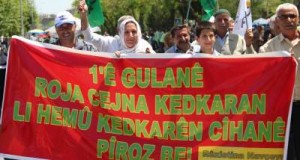
Woman holding a May Day banner in Kurdish, 01 May 2012 Diyarbakır, Turkey. (Courtesy: Evrensel)
Turkish media recently reported that a new Islamic-leaning Kurdish party will soon join the political scene in Ankara. The new party will be named Kürdistani İslam Partisi, or the Kurdistani Islamic Party. Turkey’s Political Parties Act, however, does not permit political parties to be formed with the name of a race, sect or a religion.[i]
Speaking to CNN Turk, Sıtkı Zilan, a well-known lawyer and Kurdish rights activist based in the eastern Turkish city of Diyarbakır, said that the new party, which will be officially formed by October, will embrace both the Kurdish and Islamic identities and will have a regional focus. The announcement raised questions about the movement’s possible links to Kurdish Hezbollah (not related to Shia group Hezbollah in Lebanon), a Sunni fundamentalist militant group.
Last January, Hezbollah released a new manifesto outlining the group’s political ideals which included the establishment of Islamic government. Founded in the early 1980s, the Kurdish Hezbollah is known for its fierce fight against the separatist Kurdistan’s Workers Party (PKK) in the 1990s. Some in the Turkish security and intelligence establishment allegedly turned a blind eye on Hezbollah’s activities in order to weaken the PKK’s influence.[ii] Turkish authorities, however, continuously stated that Hezbollah was financed and supported by Iran as a part of Tehran’s alleged strategy to trigger a regime change in Turkey. Most recently, a retired Turkish Army colonel claimed that he was part of a special task group that set up the Hezbollah as a part of the state’s covert fight against the PKK.[iii]
Hezbollah’s leader was killed in a police raid in Istanbul in 2000 and hundreds of members were arrested in the following years. Almost a decade after, the Hezbollah trials were concluded in December 2009. Last year, remaining 18 suspects were released due to the statute of limitations, prompting public and political reaction. Some senior members of the group are suspected to have found sanctuary in Iran and Syria after the court’s decision for their release.
Since the early 2000s, Hezbollah has been in a process of transformation into a non-militant organization, focusing on charity and education activities to spread its message. The group’s recent manifesto underlines its ultimate objective: “Muslim individuals, Muslim families, Muslim society and eventually the foundation of an Islamic government.” More importantly, the manifesto signals the group’s stance on important aspects of the Kurdish issue: “all necessary efforts will be made for Kurdish to be an official language and for public services to be made available to the Kurds in their native language.”[iv] Leaving behind its violent past, the group seems to try spreading its message through charity and media, hoping to become a popular conservative movement among the Kurds. Yet, while Hezbollah’s transformation into a non-violent movement means one less terrorist organization for Turkey, the fact it talks about creation of an “Islamic government” as its ultimate objective is still disturbing.
According to Zilan, the new Kurdish party has no relationship with Hezbollah or the PKK and its members are not affiliated with any religious movement or group. Speaking to Bianet, Zilan said the new party welcomes everyone embracing the Kurdish rights as their “natural allies;” but stressed that it was too early to talk about cooperation with the Peace and Democracy Party (BDP), Turkey’s main pro-Kurdish party. “Our target population is the Kurdish voter who feels distant to the BDP (and the PKK) and voted for the AKP in the past,” said Zilan and underlined that the new party will only focus on cities with significant Kurdish populations.
It is too early to know what exactly the new party stands for and whether it will join the coalition of Kurdish movements in the future. The party says its members are not affiliated with the existing groups; making it clear that it does not embrace Hezbollah’s ideals. Yet, the party also says it sees all groups embracing the Kurdish issue as allies. Moreover, the party’s religious character does not fully contradict with the AKP’s “Turks and Kurds are brothers in Islam, so let’s stop the fight” themed strategy, which aims to tame growing Kurdish nationalism. Therefore, if the new party succeeds in capturing enough votes (which is a small possibility given the BDP’s popularity and influence), it may find itself on the negotiation table with the AKP for a solution to the country’s decades-old conflict. It will be interesting to see how the relationship between the two will play out and whether the new party will turn into a regional ally of the AKP over time.
—
[i] Article 96 of the Political Parties Act reads as “No political party shall be formed with the name communist, anarchist, fascist, theocratic, national socialist, the name of a religion, language, race, sect or religion, or a name including any of the above words or similar ones.” Yet, there are political parties that contradict this rule such as the Communist Party of Turkey and the Nationalist Movement Party.
[ii] The so-called deep state, which refers to the anti-democratic workings within the state, composed of the members of the military, intelligence, police and the judiciary often working the mafia, allegedly assisted and trained the Kurdish Hezbollah.